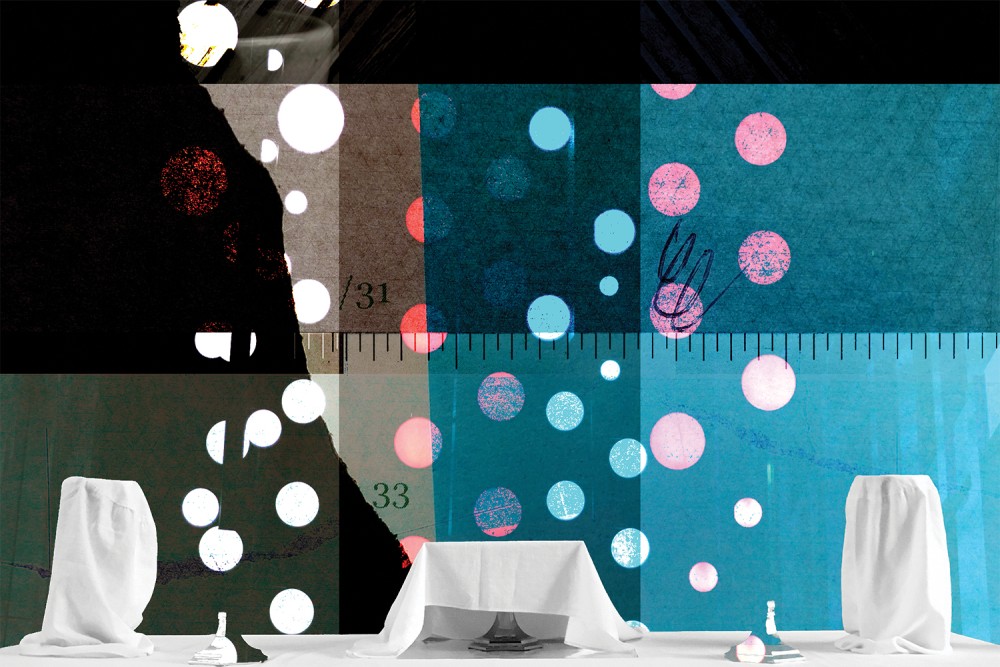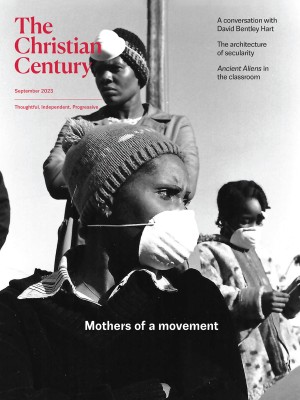Anorexia in the communion line
As I stealthily slipped the body of Christ into my pocket, I prayed that no one was watching.

Century illustration by Daniel Richardson
The body of christ, broken for you. My palms were sweating and my jaw clenched as I shuffled forward, the wayfaring anorexic in a line of worshipers.
The body of Christ, broken for you. The aroma of freshly baked bread intensified as the ritual unfolded around me, teasing my starved soul and stomach while the stream of impervious parishioners partook in a common meal of salvation. I stepped up to the plate.
Read our latest issue or browse back issues.
The carbohydrates of Christ, but not for you—the broken. These stigmatic words stabbed me like a nail in the hand that I then used to break off the most minuscule possible crumb of Christ. It’s amazing how mental illness can manipulate a message.
I turned and bowed my head as I approached the next element of isolation—outwardly a portrayal of piety and prayerfulness, but inwardly an acknowledgment of my deep-seated inclination toward self-impoverishment and starvation.
The blood of Christ, shed for you. A wave of jealousy washed over me as the devoted disciples before me dipped their freshly broken bread and delighted in the taste of grape-flavored grace.
The blood of Christ, shed for you. I rehearsed the move in my mind, knowing that the Welch’s which awaited me would add a layer of complexity to my communion connivery. I would need to stir the surface just enough to appease the unassuming elder but not so much as to allow the bread to soak up any of the blood-shaded sugar water. I stepped up to the cup.
The burden of the cross, bestowed upon you. Another nail stabbed at my soul, causing me to cringe as I skimmed the surface of the juice with my bread-shielding finger. Again I bowed my head—praying not that I would be filled with the spirit of the living Christ but that no one was watching as I stealthily slipped his bloodless body into my pocket. Tears welled up in my eyes, and guilt—not bread nor body, blood nor wine—filled my forgiveness-starved stomach as I went back to my seat, alone and empty amid a community of Christians.
The voice in my head that “blessed” that loaf of glutenous gluttony and cup of empty calories that Sunday morning was not an elder, not Christ whom they quoted, but an old adversary I’ve come to call Ed. Ed is not any ancient saint, mystic, or martyr. Ed is an acronym for eating disorder, the personification of a long and misguided quest for piety through self-punishment. Despite Ed’s popularity in contemporary culture, his origins extend far beyond the mirrors, scales, and magazine photos of a superficial society and deep into antiquity.
I was seven years old when I first made Ed’s acquaintance, roughly the same time that my father’s terminal colon cancer diagnosis stole my sense of innocence and security. My faith foundation at the time was flippant to say the least—limited to an occasional Sunday school class that my recovering Catholic mother would send my sister and me to around Easter. Since the church and the distant deity of the church’s coloring pages did not provide much in terms of support or solace, I tried to regulate the array of unpleasant emotions I couldn’t control by turning to things I could: food and exercise.
In the five years that followed, spanning my father’s initial diagnosis and death, Ed taught me many valuable lessons. He taught me how to starve off feelings of inner guilt by skipping meals, how to exhaust away obtrusive anxiety by running laps around the yard until my legs gave out, and how to fill the void in my soul with the Hostess snack cakes I kept stashed under my bed.
During this same time, I was introduced to another intriguing individual, thanks to our school’s Young Life program. This was an ancient ascetic called Jesus whose life seemed to support my self-deprecating practices. It wasn’t his teachings, miracles, or divine identity that drew me in so much as his suffering. This was when Ed got ecclesiastical.
I can still feel the holy sensation of emotional, spiritual, and physical lightness that came when I first skipped lunch in response to hearing of Jesus’ fast in the desert. A part of me still loathes the image of the White, middle-class boy who met me in the mirror upon reading about Christ’s love of the least of these—a guilt-ridden reflection of privilege that poured out from our home’s overstocked pantries and continues to speak to me through messages of social justice.
Strange how Ed can turn messages of social salvation into messages of self-hatred. I still remember how films about Christ’s death on the cross motivated me to weave my own metaphorical crown of thorns. Suffering was my only means of understanding a salvation that I didn’t deserve.
Unfortunately, what I failed to grasp through those stories of persecution and compassion was the concept of grace that Jesus’ fasting, suffering, and selflessness represented. Ed wasn’t interested in grace. My calling was suffering, not forgiveness. Ed was the false prophet of penitence without end.
The inclination to avoid food in the name of penitence runs deep in the Christian tradition, from Paul’s teachings to the early church in Rome, through the extreme asceticism of the desert tradition, right to contemporary culture’s resurgence in the celebration of restrictive eating. As an anorexic, Lent was my favorite season. It was a culturally sanctioned time to pursue fasting as a form of spiritual power.
But now, in my recovery, I see Lent not only as a time to dwell on the brokenness of the world or on emptiness of spirit but also a season to reflect on our ability to mend the world and fill our soul with true sustenance. I see now how seasons of scarcity might allow us to reflect on our abundance and grow in community in Christ.
But too often in the Christianity I have known as an anorexic, guilt leads to a sense of undeservingness, which leads to isolation. Religious fasting is theoretically a call to feast on faith—a spiritual smorgasbord that far supersedes any Friday evening fish fry—and religious ritual should encourage us to love and accept ourselves so that we might share in the plenty. Fasting might be about fulfillment, not starvation; almsgiving might be about abundance, not impoverishment. But unfortunately, this was not how I was able to see it.
We see a fascinating trajectory in the life of medieval mystic Julian of Norwich. Julian’s quest for a divine encounter pushed her to pray for a threefold favor of suffering from God through which she could behold the crucifixion in comprehension of Christ’s suffering and compassion, be made deathly ill to the point that she’d be purged of herself and able to live fully in Christ, and be granted three wounds of compassion, contrition, and willful longing by God so that she might experience true union with the Divine.
Take this as evidence to be careful what you pray for. Because when these favors were indeed granted, the God whom Julian encountered was very different from the God she expected. Hers was a union of love, not wrath. We need not strive to initiate union with the Divine through starvation, exertion, or any other means of self-induced suffering, because divine union is a given. It always has been. The mystic-minded seeker must do the one thing that is often the most difficult for the anorexia-inclined ascetic: enjoy and accept it.
Enjoyment. It is the most divine and unifying of all emotions, as well as that of which the eucharistia, or thanksgiving, meal was originally intended. My palms still sweat and I still pause before consuming the consecrated body of Christ on the first Sunday of the month. However, I now do so in awe and gratitude, not guilt. Divine union is, indeed, a given. It is an experience of ineffable grandeur, readily awaiting all who free themselves from the ego’s false conviction that we must earn grace. Christ came that we might have life and have life in abundance.






